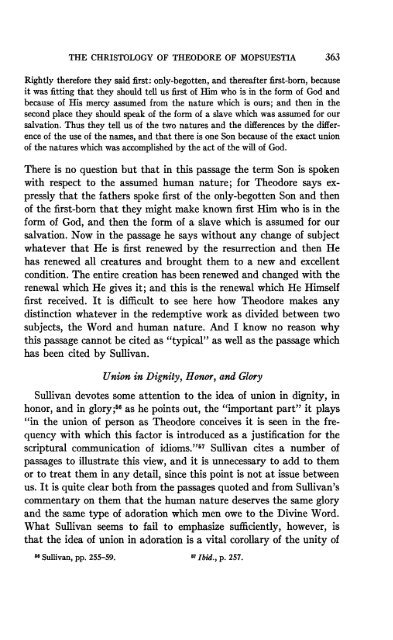ANNOTATIONS ON THE CHRISTOLOGY OF THEODORE OF ...
ANNOTATIONS ON THE CHRISTOLOGY OF THEODORE OF ...
ANNOTATIONS ON THE CHRISTOLOGY OF THEODORE OF ...
You also want an ePaper? Increase the reach of your titles
YUMPU automatically turns print PDFs into web optimized ePapers that Google loves.
<strong>THE</strong> <strong>CHRISTOLOGY</strong> <strong>OF</strong> <strong>THE</strong>ODORE <strong>OF</strong> MOPSUESTIA 363<br />
Rightly therefore they said first: only-begotten, and thereafter first-born, because<br />
it was fitting that they should tell us first of Him who is in the form of God and<br />
because of His mercy assumed from the nature which is ours; and then in the<br />
second place they should speak of the form of a slave which was assumed for our<br />
salvation. Thus they tell us of the two natures and the differences by the difference<br />
of the use of the names, and that there is one Son because of the exact union<br />
of the natures which was accomplished by the act of the will of God.<br />
There is no question but that in this passage the term Son is spoken<br />
with respect to the assumed human nature; for Theodore says expressly<br />
that the fathers spoke first of the only-begotten Son and then<br />
of the first-born that they might make known first Him who is in the<br />
form of God, and then the form of a slave which is assumed for our<br />
salvation. Now in the passage he says without any change of subject<br />
whatever that He is first renewed by the resurrection and then He<br />
has renewed all creatures and brought them to a new and excellent<br />
condition. The entire creation has been renewed and changed with the<br />
renewal which He gives it; and this is the renewal which He Himself<br />
first received. It is difficult to see here how Theodore makes any<br />
distinction whatever in the redemptive work as divided between two<br />
subjects, the Word and human nature. And I know no reason why<br />
this passage cannot be cited as "typical" as well as the passage which<br />
has been cited by Sullivan.<br />
Union in Dignity, Honor, and Glory<br />
Sullivan devotes some attention to the idea of union in dignity, in<br />
honor, and in glory; 66 as he points out, the "important part" it plays<br />
"in the union of person as Theodore conceives it is seen in the frequency<br />
with which this factor is introduced as a justification for the<br />
scriptural communication of idioms." 57 Sullivan cites a number of<br />
passages to illustrate this view, and it is unnecessary to add to them<br />
or to treat them in any detail, since this point is not at issue between<br />
us. It is quite clear both from the passages quoted and from Sullivan's<br />
commentary on them that the human nature deserves the same glory<br />
and the same type of adoration which men owe to the Divine Word.<br />
What Sullivan seems to fail to emphasize sufficiently, however, is<br />
that the idea of union in adoration is a vital corollary of the unity of<br />
56 Sullivan, pp. 255-59.<br />
67 Ibid., p. 257.
















